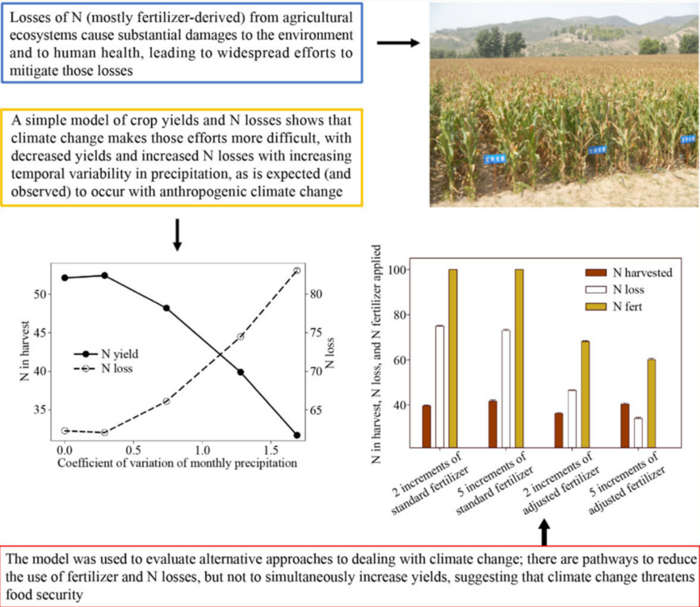Climate change (e.g., global warming) is intensifying the global water cycle and the temporal variation of precipitation has increased significantly. The distribution of precipitation is more uneven over time, and drought and flood events occurred more frequently. This unstable variability in precipitation is particularly negative for crop growth. On the one hand, temporal variation in precipitation will directly affect the timing of crop fertilizer applications, further limiting the matching of fertilizer supply and crop demand. On the other hand, the increased temporal variability of precipitation leads to an asynchronous between N supply and N demand, which indirectly leads to more reactive nitrogen losses (including leaching loss, gaseous emissions, etc.), thus causing water pollution, greenhouse gas emissions, air pollution and other ecological environment and human health effects.

Credit: Peter M. VITOUSEK, Xinping CHEN, Zhenling CUI, Xuejun LIU, Pamela A. MATSON, Ivan ORTIZ-MONASTERIO, G. Philip ROBERTSON, Fusuo ZHANG
Climate change (e.g., global warming) is intensifying the global water cycle and the temporal variation of precipitation has increased significantly. The distribution of precipitation is more uneven over time, and drought and flood events occurred more frequently. This unstable variability in precipitation is particularly negative for crop growth. On the one hand, temporal variation in precipitation will directly affect the timing of crop fertilizer applications, further limiting the matching of fertilizer supply and crop demand. On the other hand, the increased temporal variability of precipitation leads to an asynchronous between N supply and N demand, which indirectly leads to more reactive nitrogen losses (including leaching loss, gaseous emissions, etc.), thus causing water pollution, greenhouse gas emissions, air pollution and other ecological environment and human health effects.
Prof. Peter M. VITOUSEK from Stanford University and his team simulated the crop productivity based on soil moisture and temperature, and biologically available N and P from all sources (fertilizer, atmospheric deposition, and mineralization of N and P from soil organic N and P), to assess how temporal variation in precipitation affects crop yield and nitrogen losses. The model results show that the appropriate amount of fertilizer application (100 and 20 units of N and P, respectively) and the appropriate timing of addition (two-increment to the crop in the growing period, and the timing of application is closer to the growing period, the more significant the effect of increasing yield and reducing Nr emissions) can result in a higher recovery of N in harvested material of 53.6 and a lower N loss of 60.8, which is a recommended best practice for many field crops.
The increased variability of precipitation has the potential to bring extreme precipitation and a more uneven distribution of water resources, with various adverse effects on agricultural production. It was found in this study, increases in temporal variation in precipitation caused declining yields, progressively larger losses of reactive N. Such losses are likely to be particularly important for P, since the relative immobility of P causes large pools of fertilizer-derived P to accumulate in surface soils, where they are vulnerable to losses via runoff and soil erosion.
Global temporal variations in precipitation will be more dramatic with anthropogenic climate change, which will further reduce yields and increase nitrogen losses. The authors and their team hope to explore solutions that could address this climate risk. However, adjusting fertilizer application amounts (~30%) depending on soil moisture content will reduce reactive N losses (~50%) but does not increase crop yields. In rainfed agricultural ecosystems, climate-change-driven increases in temporal variation in precipitation will make it difficult to sustain cropping systems that are both high yielding and have small environmental and human-health footprints. In short, it seems likely that we will face increasing challenges to food security with the ongoing enhancement in precipitation variability.
The atmosphere is a highly complex system. As the greenhouse gases emitted by humans accumulate in the atmosphere, they may eventually cause extreme weather events such as rainstorms. Only if countries around the world step up their efforts to reduce emissions and achieving carbon neutrality as soon as possible can we able to change the Earth’s climate and the future of our home.
This study has been published on the Journal of Frontiers of Agricultural Science and Engineering in 2022, DOI: 10.15302/J-FASE-2022452.
###
Original article
Peter M. VITOUSEK, Xinping CHEN, Zhenling CUI, Xuejun LIU, Pamela A. MATSON, Ivan ORTIZ-MONASTERIO, G. Philip ROBERTSON, Fusuo ZHANG. CLIMATE-CHANGE-INDUCED TEMPORAL VARIATION IN PRECIPITATION INCREASES NITROGEN LOSSES FROM INTENSIVE CROPPING SYSTEMS: ANALYSIS WITH A TOY MODEL. Frontiers of Agricultural Science and Engineering, 2022, 9(3): 457–464 https://doi.org/10.15302/J-FASE-2022452
About Frontiers of Agricultural Science and Engineering
Frontiers of Agricultural Science and Engineering (FASE) is an international journal, which is aimed to publish papers that advance the understanding of scientific, technological/engineering, socioeconomic, institutional/policy and management factors that drive current and future agricultural productivity and sustainability. Our goal is to use FASE as a platform to foster scientific information flow, stimulate transdisciplinary inquiries that have strong multi-disciplinary connections, and cultivate research and idea exchanges that address agricultural sustainability challenges regionally and globally.
FASE is an open-access journal published quarterly with no page charges. Contributions may include cutting-edge research, science news, commentaries, perspectives, or reviews. In addition to publishing regular review and research articles, the journal also publishes ‘Hot Topic’ issues that focus on strategically selected subject matter of high impact, or emerging concerns to address future agricultural development pathways at regional and global levels, and are guest-edited by scientists in their areas of research. Proposals for special issues are welcome and can be submitted any time.
Journal
Frontiers of Agricultural Science and Engineering
DOI
10.15302/J-FASE-2022452
Method of Research
Experimental study
Subject of Research
Not applicable
Article Title
CLIMATE-CHANGE-INDUCED TEMPORAL VARIATION IN PRECIPITATION INCREASES NITROGEN LOSSES FROM INTENSIVE CROPPING SYSTEMS: ANALYSIS WITH A TOY MODEL
Article Publication Date
9-Sep-2022




